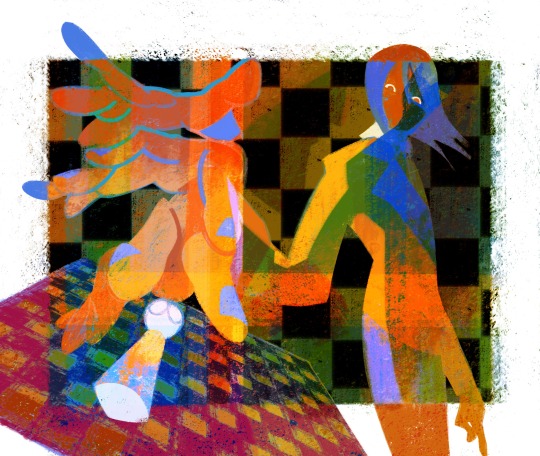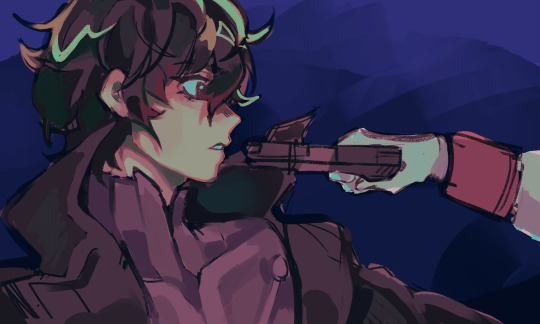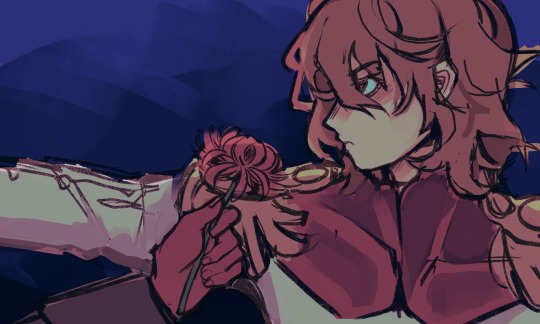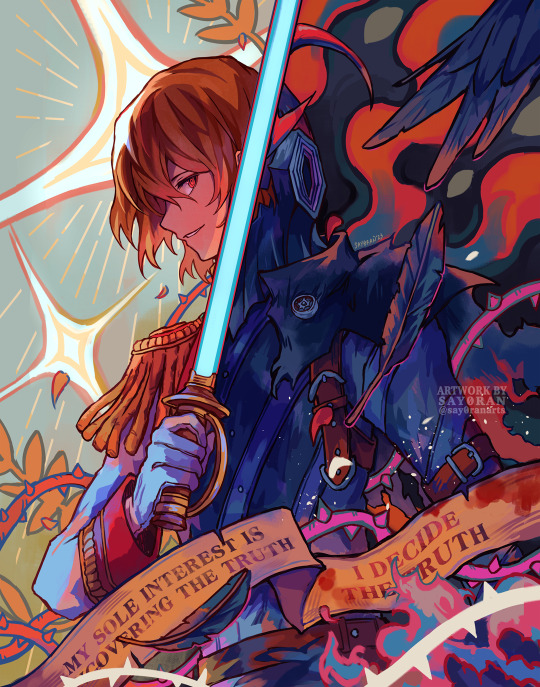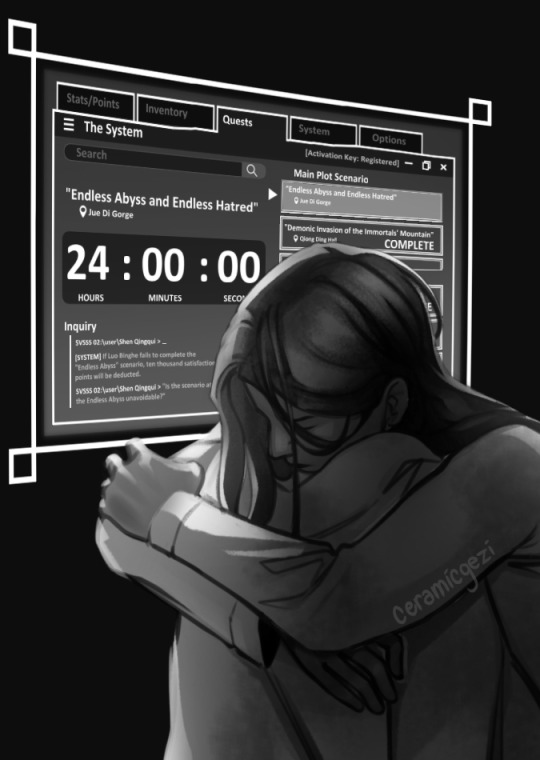Text


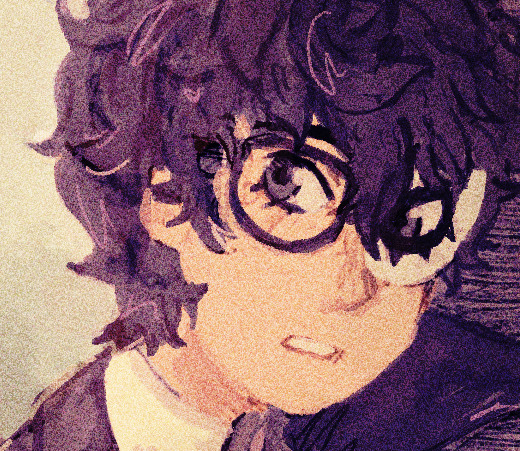
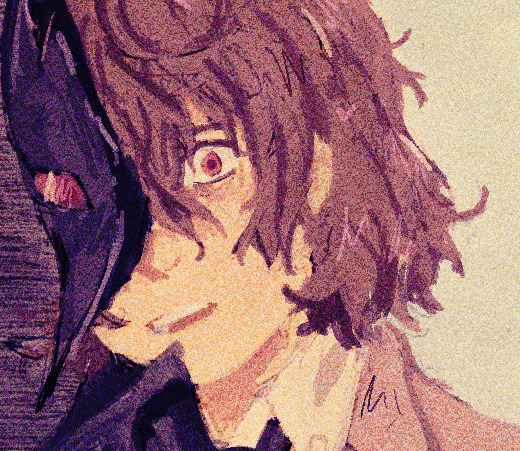
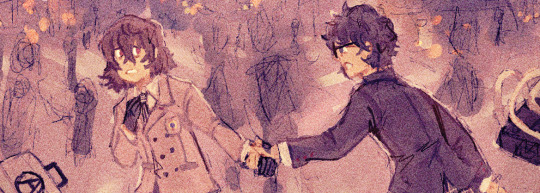
New Game + ...but they both remember the previous timeline.
2K notes
·
View notes
Text
Prompts: Ruelle Lyrics
Hello! Wanted to try something a little different to what I usually do on this blog, so I made my first set of writing prompts (and/or art prompts if you so wish). Ruelle is one of my favourite music artists, and her lyrics are just so hauntingly beautiful that I had to compile a few that I think would make really good fic title ideas or a prompt. I highly recommend checking her out, too!
These aren’t necessarily dialogue prompts, this is more of a prompt that is meant to evoke a vibe/idea. Hope that makes sense. Without further ado, here are the lyrics!

And I can’t sleep, ‘cause thoughts devour; thoughts of you consume
I can’t help but want oceans to part, 'cause I’m overcome in this war of hearts
We are buried in broken dreams; we are knee-deep without a plea
The stars choose their lovers, save my soul
How do you fly with no wings? How do you breathe without dreams?
Whatever may come, your heart I will choose; forever I’m yours, forever I do
Cut me deep, the secrets and lies; storm in the quiet
Nowhere to run from all of this havoc; nowhere to hide, from all of this madness, madness, madness
No heartbeat left in me, there is no air here left to breathe
There used to be light; but now it’s all empty space
Everything you touched I loved; even though it left me numb
Love me like you mean it
Hold me like the moon holds onto the tide
I see the world racing next to me; but we’re frozen, lost in time
We’ll set fear on fire
Faith falls hard on our shoulders
Can you take this weight of mine?
I am under the surface where the blackness burns beneath
We feel warmth in the cold corners
To carve our names with fire

Feel free to like & reblog if you use these! Happy writing <3
45 notes
·
View notes
Text
Shen Qingqiu faked it til he made it a little too hard, and now this is just who he is
204 notes
·
View notes
Text
More, they said. We need more, they said. Well, have more. I don’t think anyone wanted this exactly, but that’s what you’re getting.
Keep reading
57 notes
·
View notes
Note
Hunxi, you’re doing the lord’s work for promoting in the Qian Qiu fandom!!! I’m not sure if you spoke about this before, but on a personal level, why do you love Qian Qiu so much?
I don't know if I'm so much promoting 《千秋》 as I am just generally losing my mind about it on a fairly regular basis, but people continue to indulge me while I do so, so I shan't complain
I've been mulling over this question for quite a while now, trying to suss out exactly why I love 《千秋》 so much, and honestly, I think the answer is just... Shen Qiao
except it's never "just" "Shen Qiao," but rather Shen Qiao and his journey, Shen Qiao and the world he moves through, Shen Qiao and the intersection of themes and questions that the author investigates through his adventures, his experiences, his lowest points, his greatest heights. again, his is a character that seems simple, even two-dimensional on the surface, but the more time I spend with the text, the more his understated complexity and quiet reflections become apparent
there's a moment fairly early on in the novel that's always really stuck with me -- Shen Qiao and Yan Wushi, while entering a city, pass by a family of refugees. Shen Qiao, in a moment of soft-heartedness, hands a 饼 to one of the children, only to have the father steal it and eat it all himself, then turn around and alternately wheedle and threaten Shen Qiao for more. though we are never actually concerned for Shen Qiao's safety, the confrontation is ugly, and afterwards, Yan Wushi naturally uses the moment as another 'human nature is inherently evil' teaching lesson:
待他走近,晏无师才道:“斗米恩,担米仇。这句话,你有没有听过?” When When [Shen Qiao] came close, Yan Wushi said, " 'A handful of rice may bring gratitude, but a bushel of rice will bring enmity.' Have you heard this saying before?"
沈峤叹道:“是我鲁莽了,受苦的人很多,凭我一己之力,不可能救得完。”
Shen Qiao sighed. "I acted rashly. Many people are suffering, and with only my strength, I cannot save them all."
晏无师讥讽:“人家父亲都不顾孩子死活了,你却反倒帮人家顾着孩子,沈掌教果然有大爱之心,只可惜人性、欲壑难填,无法理解你的好意,若今日你不能自保,说不定现在已经沦为肉羹了。”
Yan Wushi said, mockingly, "The father didn't even care about his children's survival, yet you did. Sect Leader Shen truly has great benevolence in his heart. It's just a pity that human nature is like a vast, unfillable abyss that cannot understand your good intentions. If you couldn't protect yourself today, you might already have become meat paste."
沈峤认真想了想:“若今日我不能自保,也就不会选择走这条路,宁可绕远一点,也会避开有流民的地方。人性趋利避害,我并非圣人,也不例外,只是看见有人受苦,心中不忍罢了。”
Shen Qiao diligently thought about this. "If I couldn't protect myself, I wouldn't have chosen to take this road. I would have rather walked farther around to avoid a place with refugees. Human nature naturally pursues benefit and avoids harm. I'm no saintly sage, and I'm no different. It's just that I saw someone suffering, and couldn't bear it in my heart. That's all."
他择善固执,晏无师却相信人性本恶,两人从根源上就说不到一块去,晏无师固然可以在武力上置沈峤于死地,但哪怕是他扼住沈峤的脖子,也没法改变沈峤的想法。
He stubbornly chose goodness while Yan Wushi believed that human nature was inherently evil. From their basic premises, the two of them simply could not agree. Yan Wushi could of course use his martial ability to kill Shen Qiao, but even if he held Shen Qiao by the throat, he had no way of changing Shen Qiao's mind.
(chapter 16)
this by no means the first or only time Shen Qiao interacts with refugees and beggars, people driven to the ends of their tolerance and survival, people fallen on hard times, on political crises, prey to the fickleness of fortune and the rising winds of war. and, when you look at these scenes scattered throughout the book, only a few instances of these interactions are really, truly plot-relevant
which is to say that a lot of these moments are, strictly speaking, unnecessary for the forward movement of the narrative
and this is so incredibly powerful to me, because -- my god. when was the last time a beggar was allowed to be just a beggar in a wuxia danmei novel, not a spy, or an informant, or an assassin, or a member of the 丐帮 Beggar Gang, but a beggar, with all the intersectional questions of class and caste and governance and morality? when were minor figures allowed to be just that -- minor figures, passerbys, not secretly a protagonist in disguise, or a cardboard cut-out of an extra, or purely symbolic in function, but you know, a regular chump going about their dull faux-historical peasant life?
how many books have their protagonists declaring that they are doing this "for the 苍生 common people," yet never really show those people on the page, or give those people a voice? how often are the poor (in a wuxia novel, no less) allowed to be more than saintly sufferers or morally corrupt, and how often do we see a narrative where our protagonist is confronted with these questions of class and privilege repeatedly, instead of a one-time save-the-cat event that serves more to illustrate a character’s virtue than it comes to examining the actual societal issues at play?
Shen Qiao's beliefs and morality are tested again and again and again throughout the novel -- in big ways, with Yan Wushi, but also in little ways, in these passing moments. Shen Qiao is the best of them all -- the kindest, most benevolent, most compassionate, most forgiving -- and even he chooses, on occasion, not to help, not to give everything of himself when demanded
earlier in that scene, the man asks Shen Qiao for more food, and Shen Qiao refuses. I gave you one 饼, Shen Qiao says, I only have one other, and I need to keep that for myself. we might expect a protagonist as good, as benevolent, as compassionate, as merciful as Shen Qiao to immediately cave and give up everything he has to help ease someone else’s suffering, but he doesn't. Shen Qiao is the best of all of us, and his actions show us that generosity does not have to be unlimited to be valuable, that goodness is not necessarily measured by the extremity of self-sacrifice
I'm not trying to say that 《千秋》 is an insightful commentary on historical class dynamics (it’s... not), or that it handles issues with exceptional sensitivity and nuance (jury’s out on this one). but it's little moments like these in the novel that make the world feel more real, its characters more firmly grounded. the Big Questions in 《千秋》 are concerned with morality and conduct, personal cultivation and social responsibility, what it means to be a good person in a world on fire, when you yourself have been deeply wronged by the world and the people/systems of power in it. and what I find incredibly compelling is the fact that Meng Xishi devotes ink and time to both the heightened, fictional, dramatically extreme variants of these questions as well as the minute, pedestrian, and uncomfortably real
the world of 《千秋》 rejects the simple binary of good and evil; it also rejects a simplistic view of what constitutes good or evil. good is more than charity, or forgiveness, or self-sacrifice, or brandishing a sword in the name of the "common people." likewise, evil cannot be reduced to just selfishness, self-interest, sadistic cruelty, or ambition. "good' and "evil" are labels, tacked onto you by loose tongues and jianghu gossip; "good" and "evil" are excuses, indiscriminately weaponized by people furthering their own agendas; "good" and "evil" are performative, external, empty; flattery, slander, meaningless
sometimes you fight to the best of your ability but your body cannot withstand the stress, and you end up coughing up blood and fainting. that is okay. sometimes someone repays your kindness by stabbing you in the back. that is okay. sometimes you have resentful, vengeful thoughts about other people who have wronged you and consider acting upon them. that is okay. sometimes you try your best to save a sickly child, and fail. the child dies in your arms. that is okay. sometimes you find out that your best intentions in the past were in fact short-sighted and selfish. that is okay. sometimes you come face to face with your own privilege, of a happy childhood, of naturally endowed martial talent, of education and access and health and ability. that is okay. sometimes you do everything in your power to try and become friends with someone, only to have them sell you out in the most viciously vindictive manner possible. that is okay.
goodness in 《千秋》 is no guarantee of reward; kindness to others has no guarantee of repayment. especially in the first third of the novel, it often feels like no good deed goes unpunished as events continue to backfire in Shen Qiao’s face. through Shen Qiao and the absolute hell he gets put through in the first half of the novel, Meng Xishi hammers this home: it isn’t easy to be good. in fact, it can be profoundly unrewarding, exhausting, even laughably naive when it would be so easy to... abridge certain morals. take a shortcut. make an exception here. everyone is just trying to survive in a world on fire, and noble words about virtue and conduct pale in the face of desperation and need
I keep thinking of this exchange, from when Shen Qiao decides to go back to save Yan Wushi:
十五:“您将他当作朋友,他不应该也将您当作朋友吗?”
Shi Wu: “You treated him like a friend; shouldn’t he also treat you like a friend?”
沈峤笑了:“不对。这世上,有许多事情,即便付出了,也很可能根本不会有回报,你在付出的时候,要先明白这一点,否则受伤的只会是你自己。”
Shen Qiao smiled. “You’re wrong. In this world, there are many things that, when you’ve paid for it, you cannot expect any sort of return. When you pay for it, you have to understand this, or else the only one who will be hurt will be you.”
(chapter 52)
I think we get a lot of stories about the radical power of empathy and forgiveness, narratives where a character’s heart and sheer goodness become something of a superpower, absolutely critical to the resolution of the conflict and the closure of the story. and those stories are some of my favorites, especially when they recognize that forgiveness is more than just a saintly forbearance, but also a negotiation of your own emotion, a necessary step towards your own closure
but kindness or compassion or empathy or goodness aren’t single, one-time events. they’re continuous and exhausting, like trying to fill up an abyss with a toy shovel. they’re often unrewarding, or invisible, or misinterpreted, or just plain go awry. 《千秋》 gives us so many iterations where characters’ good intentions rebound in their faces, or result in misfortune, and the narrative pushes past this to show us the value in continuing to make these decisions in defiance of our past experiences
or, in other words: kindness and compassion have no guarantee of reward or repayment, but that doesn’t make them any less valuable, and honestly, as someone who grew up on fantasy and the intoxicating cocktail of heroism and morality and happy endings that it often promises, 《千秋》’s understated realism and complex take on the personal cost of goodness was a story I haven’t really seen told, and didn’t know I desperately needed
104 notes
·
View notes
Text
SV Season 2 Visual Poster
Source: https://m.weibo.cn/6779326896/4667868739797725

165 notes
·
View notes
Note
Omg Hunxi! You’ve read SVSSS?! What did you think of it? What’s your opinion on Luo Binghe? It’s often looked down upon among the 3 novels, but I personally love it and it’s chaotic energy.
I mean, I've only read 2/3 of MXTX's novels, but I have a suspicion that SVSSS might be my favorite because the book is batshit insane and also so much fun
there's this manic energy to it that generates a heady mix of irreverence and intensity, slingshotting you from startled laughter to stunned silence and right back with the maximum amount of emotional whiplash possible
incidentally, this novel taught me more Chinese internet slang in <100 chapters than I've learned in my entire life
the best analogy I think I could make might be that... SVSSS kind of has the same energy as Bo Burnham's Inside? in that it is simultaneously a satire, a love letter, a deconstruction, and a reimagining of a genre (for Inside, Netflix comedy specials; for SVSSS, transmigration and stallion webnovels), while doing a really damn good job of its most direct purpose (being a rollicking good ride all the way down)
but sdlkfjsdlfkj Luo Binghe. oh man what a character
I feel like, no matter what long paragraphs or thematic complexity I can tease out of Luo Binghe and his characterization, his character arc and journey, no amount of words I write can beat @blackelement7's one-sentence summation of his character, which is: it's hard to be Luo Binghe
and really, much of SVSSS revolves around the deconstruction of narrative and character tropes--like, literally. (Shen Yuan as) Shen Qingqiu dismantles the ludicrously hackneyed and exaggerated plot of PIDW and accidentally puts it back together in a different shape just by, y'know, existing and being -- get ready for this -- a decent person
so Luo Binghe fits into this whole agenda by deconstructing a familiar archetype of the masculine, heroic protagonist--virile, undefeatable, hopelessly attractive, naturally talented, beloved of fate/happenstance/coincidence, unique and unlikely inheritor of multiple legacies, gifted with unrealistic sexual prowess. he has the tragic orphan origin story, the bitterly cruel and traumatic youth, then the vengeful return, the eventual violent triumph over those who had wronged him, his """happy""" ending of supreme power and supreme sexual satisfaction and supreme unbeatability
or at least, that's the original Luo Binghe
MXTX takes this larger-than-life legendary figure and shows us his hidden shadows, his deep insecurities, the flaws that have been expunged by the demands of readers and narrative (and oh boy does this book have things to say about the relationship between the author and the consumer). she takes the original Luo Binghe (and by extension, the entire stallion genre) gently by the hand and asks, have you found love?
I have a harem of hundreds of beautiful women, the original Luo Binghe replies.
have you found satisfaction? MXTX asks.
I rule the entire world, both human and demonic realms, he replies.
are you happy? MXTX asks, and cruelly, crucially--the original Luo Binghe cannot answer yes, and have that be true
MXTX takes every aspect of the original Luo Binghe and systematically subverts it: his virility is undercut by the fact that the person of his affections prefers Luo Binghe's younger, innocent self, not the virile, manly man that maidens ostensibly swoon over. Luo Binghe's undefeatability and ridiculous talents are undercut by the fact that no amount of strength, or power, or influence, will get him what he truly wants -- Shen Qingqiu's genuine love and affection. in the original PIDW, the goddamn trauma congo line that Luo Binghe gets put through only makes him stronger, laying the foundation of his eventual, triumphant, vengeful return. but in SVSSS, we see all the ways that Luo Binghe's trauma doesn't make him stronger -- in fact, leads him to incredible levels of insecurity and self-sabotage and self-hatred
or, in short:
PIDW: I've done it, I've crafted the perfect stallion novel protagonist
MXTX, busily typing: no you haven't, you've fucked up a perfectly nice young man is what you've done. look at him, he's got enough trauma to cause the apocalypse
a lot of our understanding of Luo Binghe is filtered through the lens of Shen Qingqiu, who is one of the most unreliable narrators I've ever had the privilege of laughing at. much of Shen Qingqiu's character arc in the novel is coming to realize that the people around him -- Luo Binghe, yes, but also Yue Qingyuan, Liu Qingge, all the women previously dismissed as love interests, and even, eventually, Shen Jiu -- are actually people too, not just flat fictional characters, but individuals with agendas and feelings and unwritten histories of their own. Shen Qingqiu is so preoccupied (and rightfully so!) with his fate and foreknowledge of the plot that he fails to notice for a comically long time that the plot has changed on him while he was busy jumping to conclusions what certain people must be thinking
but back to Luo Binghe. the novel takes Luo Binghe's intense traumas and fears -- abandonment, self-loathing, rejection and very real hurt -- and makes them matter. past suffering doesn't just build character to make you stronger in the future -- you have to come to terms with it first, gain closure, let the wound heal over before you can safely build upon it. and despite having loyal subordinates, despite having more love interests than he can shake a evil sword at, Luo Binghe has no one to truly, emotionally support him
all those people flocking around him, all those women (allegedly) trying to sleep with him, and Luo Binghe doesn't have a single friend
the original PIDW would have you believe that's indicative of his strength and independence, his ability to stand alone. a Man (TM). MXTX takes one look at that and calls bullshit
or, in other words:
PIDW: I've done it, I've crafted the ultimate male fantasy
MXTX, typing faster: no you haven't, you've subscribed to toxic masculinity is what you've done. you created a lonely, overpowered young man who only knows how to deal with his problems through violence. look at him, he's got abandonment issues and unhealthy masochistic tendencies
(masochism is fine! but someone needs to gently pull Luo Binghe back into the realm of kink rather than deliberate self-harm, and while we're at it someone please give this man a hug without also detonating at the same time)
SVSSS takes the unrealistic, overperfected model of an archetypal male protagonist and shows us all the ways this person (and this model) is broken. the text constantly cracks jokes about 'the protagonist halo,' but for much of the book, Luo Binghe is never allowed to be a person--he is always The Protagonist, the half-demon spawn, the existential threat to the human cultivation world, and Luo Binghe’s continual dehumanization breaks him. and guess what? the eventual resolution of the conflict comes from nothing more and nothing less than Shen Qingqiu showing kindness. was it messy and fraught as hell? you fucking bet it was. but was the underlying message of the entire story also as simple as "but the villain needs love too!" you fucking bet it was.
this is a running theme in MXTX’s writing--we see it prominently in both SVSSS and TGCF: the colossal, literally world-saving power of empathy, and kindness, and love, and forgiveness, and that, I think, is crucial for understanding and appreciating Luo Binghe as a character
2K notes
·
View notes
Text
For anyone who wants to enter giveaways for the official English MXTX novels, Seven Seas Danmei is going to RT some giveaway posts by generous fans!!
https://twitter.com/gomanga/status/1423352436778053634?s=21
10 notes
·
View notes
Text




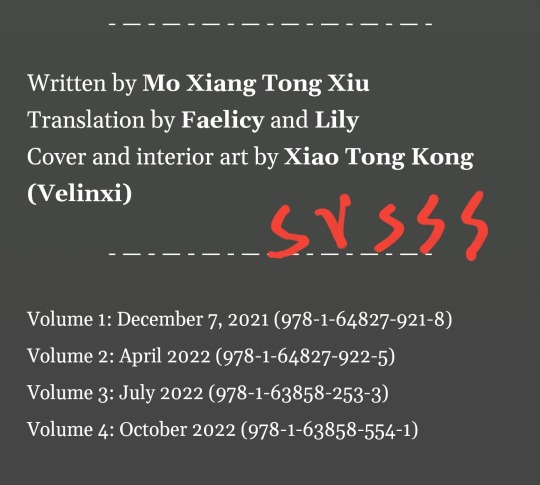
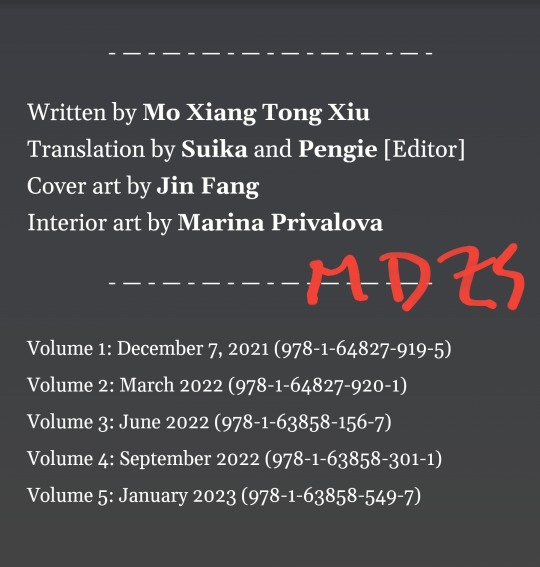
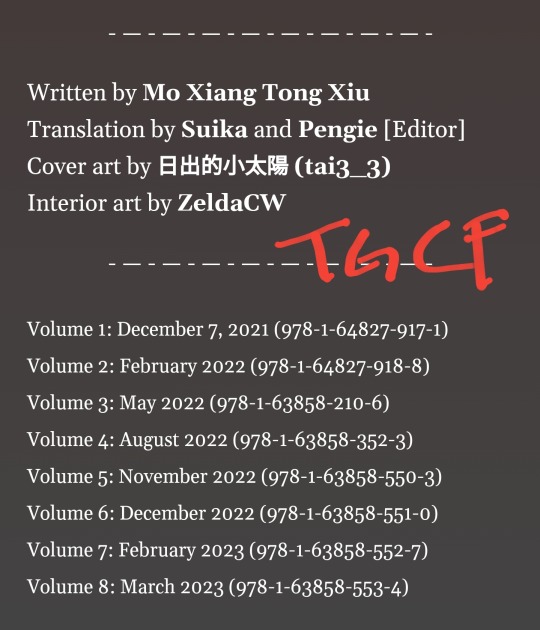
ALL THREE MXTX NOVELS ARE GOING TO BE OFFICIALLY PUBLISHED IN ENGLISH, THIS IS NOT A DRILL, IT'S REAL AAAAAAAAAAHHHHHH
Here is the link: http://sevenseasdanmei.com/
Also, please check suika's tweet for more details: https://twitter.com/yummysuika/status/1422968206420021253
9K notes
·
View notes
Text


WE'RE ACTUALLY GETTING SVSSS DONGHUA SEASON 2 WTF???????
52 notes
·
View notes
Note
Miss Faelicy I would love to get your opinion on Bingqiu.
I see people posting things like how they are "problematic" and how they don't really love each other and SQQ only feels sympathy etc. Obviously there were struggles between them as there should be (considering all that happened) and just because sqq wasn't very open and super obvious about his feelings doesn't mean they are not there..this is how I interpreted it. I would love to know your opinion
Hello! This also covers part 2 of the previous ask.
First, massive spoilers for the end of the novel. Second, a disclaimer: I despise shipwars, which I think are behind most of those comments. I hate them because it's usually all in bad faith: everyone's already committed to their interpretation of the ships, and any discussion is just a guise for justifying their preferences.
So to any readers: I don't want anything here to be used as shipwar fuel. This post is about Bingqiu's canon arc and themes. Basically, I don't know or care if Bingqiu is a good ship, but I do think it's a well-written one.
I'll start by saying directly: for most of the novel, Bingqiu is neither healthy nor romantic. And that this is not bad writing, but on purpose.
A relationship that drives one party to mental breakdown isn't healthy. A relationship where that party says it's okay to hurt or kill them can't possibly be healthy. That happened because there was something deeply wrong with their relationship, something that can't be reduced to Xin Mo, miscommunication, or LBH throwing a tropey yandere fit.
And out of all three MXTX novels, only SV lacks a love confession from the MC to the ML. Again, I don't think it's an oversight, or just because SQQ's face is too thin. There are plenty of ways MXTX could have worked a subtle one in if she really wanted to.
In my opinion, Bingqiu's narrative can be split up into four arcs: Qing Jing Peak (ch 1-27), Jin Lan City (28-43), Post-revival (29-55), and Reconciliation (56-81). Other than the first arc, where their relationship is pretty straightforward, Bingqiu spend most of the rest in direct conflict.
I'll give an overview of the arcs here, but what I truly want to say about Bingqiu starts in arc 4, so if you're impatient you can scroll down. But the overview might help add context.
Jin Lan City arc is about LBH's anger at being brutally betrayed by the one person he thought he could trust. Here he tries to force answers out of SQQ, who he believes both hates him and is a hypocrite. He's driven by a desire to return to the past, but his rage and love makes his actions contradictory: on one hand he tries to win SQQ's approval constructively, by climbing to the top of Huan Hua Palace and performing good deeds, on the other hand his belief that SQQ doesn't care about him so it's all futile anyway (reinforced by SQQ's own actions) causes him to lash out destructively, going as far as to hurt and imprison SQQ.
LBH's bitterness is portrayed very negatively, because all it does is instill despair into SQQ, until SQQ ends up believing that he's only been a blight on LBH's life, and that he must make up for it by killing himself. Whereupon LBH breaks down, regressing into a childlike state. Some might ask, why does LBH never bring up the Abyss again afterwards? It's because he gives up here. This entire arc is about getting LBH to let go of past wrongs and to stop seeking answers, whether the reader believes it's fair to him or not. Because SQQ's life is more important.
Post-revival arc then is about SQQ trying to come to terms with a blackened LBH who also loves him. Interestingly, despite SQQ's horror at realizing LBH was romantically interested in him all along, SQQ actually has a very subtle but telling secondary reaction. To explain, let's back up to the first arc.
Starting around ch 9, probably as a sign of his growing affection, SQQ begins addressing LBH as 这孩子, or "this child," in his internal monologue, instead of LBH's name. He does it once each in ch 9, 12, 17, 21, 25. However, once Jin Lan City arc starts, SQQ drops the address entirely. LBH and "child" are never brought up together except for one snarky comment on LBH's tantrum being disgracefully childish in ch 38.
At first glance this doesn't look noteworthy because LBH by this point is no longer a kid. But when LBH kisses him in ch 49, SQQ changes again: right away he returns to using "child" on LBH, and the "this child" address starts popping up at a much higher frequency. By the end of SV SQQ has referred to LBH as a child in some manner at least 35 times (yes I went and counted), with the vast majority after ch 49, and he continues to do so right into the last extra.
Why was SQQ unwilling to use this address of affection for over 20 chapters? Perhaps because he too thought LBH hated him, and couldn't bear to think about him so intimately knowing that. So SQQ immediately falling back into it the moment he learns LBH loves him is a sign of his relief. He's still dismayed at the romantic part, but though SQQ likes to deflect from his real emotions (this is the guy who focused on bad naming sense after being fatally poisoned, who cavalierly commented only after it was all over that he'd expected to die), the fact that LBH loves and doesn't hate him, means a lot.
Here SQQ's feelings towards LBH are at their most complicated. He still assumes the worst of him like in Jin Lan City, but now because of the above, also sees a lonely child whenever LBH is unhappy and lost. It's like he has two filters actively interfering with each other, "crazed criminal" and "pitiful child," and so he flip-flops between pushing LBH away and comforting him. But when LBH drags CQMS into it, and even seemingly takes advantage of SQQ's love for him, SQQ's negative image and frustration with him only grows, until he finally snaps and tells LBH to never come near him again.
At this point SQQ still believes that LBH is the same black-hearted, invincible, devil incarnate that og!LBH was portrayed to be. The Reconciliation arc starts by chipping away at this filter that's been plaguing SQQ for so long. First the revelation that TLJ/ZZL was behind the sowers, thus clearing LBH's name at Jin Lan City. Then we see how unloved he is by his own father; we see him injured and helpless and unconscious. Meng Mo yells at SQQ, reinforcing that image of a vulnerable, terrified child. So by ch 62 SQQ has thrown away the "crazed criminal" filter completely, and in that same chapter they cling to each other and finally make up. Because while it's true that the current LBH is misanthropic, antisocial, and mercurial, SQQ has also finally accepted that he's still the same LBH he'd raised and doted on, back on Qing Jing Peak.
Now I'm going to talk about what I see as the most important part of Bingqiu. Yes, despite the wall of text already.
A common sentiment of Bingqiu shippers about their issues seems to be, "SQQ is dumb and oblivious; he can't figure out what LBH needs even though he loves him because he sees LBH as a novel character," but I think the problem is far more complicated and insidious than that. If that was everything, why give SQQ the epiphany that he misunderstood LBH so early? Why have him think in ch 66 that "truthfully, he'd never really trusted Luo Binghe, and that's why he kept accidentally hurting him?" If he's already realized that he shouldn't treat LBH like og!LBH (he even meets og!LBH in ch 71 to rub it in further), why do we go another 13 chapters believing their relationship is good and well, even giving us a sweet, happy moment in ch 75, only to show LBH having the worst breakdown of the novel just 4 chapters later? Was it all just padding to demonstrate the danger of Xin Mo?
Or is there something else beneath the surface?
In ch 66, the same chapter where SQQ implies he doesn't want to accidentally hurt LBH anymore, he says something telling. When LQG is skeptical that LBH can be trusted, SQQ thinks, 家里孩子不懂事,大人不容易做, or "when your child doesn't know any better, as the adult you don't have it easy." The child here of course refers to LBH, and the adult is SQQ, who's complaining about smoothing over LBH's messes. But what is SQQ implying here?
Doesn't know any better? That's what you say about a toddler who can't think for themselves, not a grown man. LBH is 25 and SQQ thinks he doesn't know better. Doesn't know better about what? LBH's wants, his needs? His feelings? Or even what's good for him?
And then you realize that's exactly how SQQ's always treated him, like a helpless child who can't make his own choices.
It's SQQ who chooses to throw LBH down into the Abyss without trying to talk to him. It's SQQ who decides that keeping silent is the best choice. It's SQQ who believes self-destructing in front of LBH will help, who thinks that breaking off their relationship is for the better. And it's SQQ who scolds LBH into tolerating CQMS, even though they hate each other and CQMS is hostile towards him. Who forces him to leave first at Zhao Hua Temple despite LBH's pleas otherwise, who shoos him out the window when CQMS walks in on them.
Every single one of these decisions, SQQ made believing it was for the best (repair LBH's relationship with his family, help him avoid arrest, not wanting to make excuses, wanting LBH to be free of his hatred), and every single one of them only damaged LBH further. Because SQQ's never listened to him, even once. Never consulted him or considered his feelings.
(And LBH did try to bring up his feelings on one of the matters in ch 75. He insinuates to SQQ that he doesn't like LQG calling him "little beast" or "ingrate." And SQQ's response is to dismiss them entirely, saying that LQG's "not wrong.")
SQQ has always loved LBH, but he's never once respected LBH's agency or personhood. Because LBH doesn't know better and SQQ does, so SQQ must make all his decisions for him.
And this, amplified by Xin Mo, is what finally drives LBH mad in ch 79.
To LBH, the important part isn't whether SQQ loves him, which I think he knew after ch 43 (it's why he can be so daring and pushy with SQQ's boundaries). What's important is that the moment SQQ believes abandoning LBH is justified for whatever reason again, SQQ absolutely will.
Ch 80's two-way noncon (since LBH was basically unconscious and couldn't consent) tends to draw most of the attention, but I actually think that what happens afterwards is one of the most important scenes for Bingqiu. There SQQ tries to sacrifice himself a second time for LBH, drawing Xin Mo's demonic qi into his body. Yet the novel claims that SQQ's actions here are completely different than in ch 43. SQQ himself says that this time he's doing it for LBH, while last time he was doing it for himself. But can the reader see a functional difference?
There is one, in fact: it's SQQ's response to LBH's choice afterwards. LBH decides to follow SQQ in death, even though this would void the point of SQQ's sacrifice. But instead of insisting otherwise, SQQ just accepts it. Because he finally understands that whether LBH's life is worth living, whether LBH will be better off, is for LBH and only LBH to decide.
It's the first time he respects LBH's agency. And this is the only reason why he and LBH can finally begin building a healthy relationship on the mess they've had up to now.
So that's what I see as the true beauty behind Bingqiu. It's about communication and mistaken assumptions, yes, but it's also about the nature of love between parent and child. The romantic developments were left to the extras, I believe, because this was the main story MXTX wanted to tell with them. Their relationship as lovers only starts afterwards, hence why SV ends with, "the story between you and I, has only just begun." It was never meant to be a whirlwind romance where they fall in love cleanly. It might not to be to everyone's tastes, but an incredible amount of thought was put into the narrative, and that's what amazed me when I first finished this novel.
(This post went on way too long and I ended up cutting off a huge chunk of tangential stuff and how SQQ came to his realization in ch 79: he didn't do it alone. It took him seeing the LBH in TLJ and the himself in YQY for him to understand. In fact, YQY and og!SQQ's relationship has a similar parent-and-child dynamic. I've touched on it before on twitter; if there's interest I might try writing that up here too.)
785 notes
·
View notes



